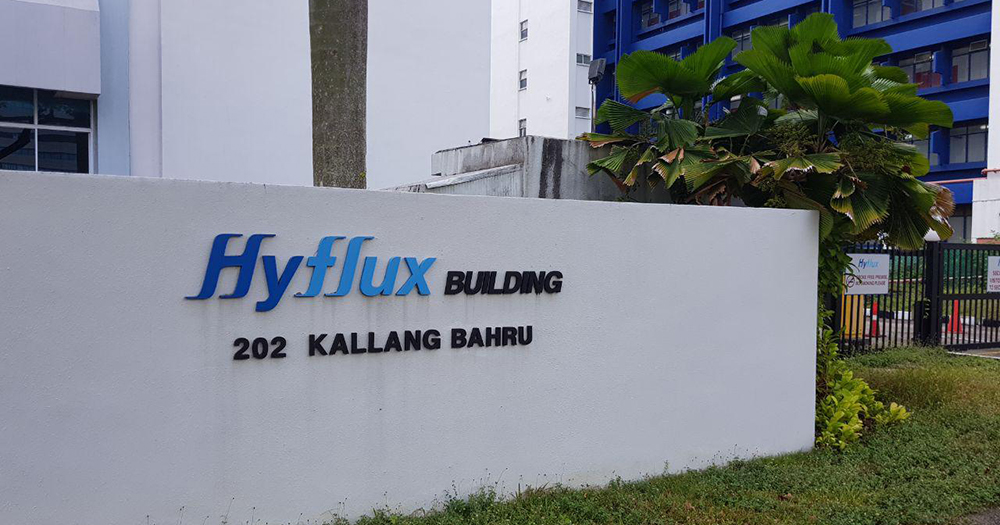On April 17, the PUB, Singapore’s national water agency, issued a notice that it will take over the Water Purchase Agreement (WPA) and the Tuaspring Desalination Plant (TSDP) from Tuaspring Pte Ltd.
According to PUB's press release, this will be done 30 days after April 17 and it is a move to safeguard Singapore's water security.
This new development follows on the heels of the collapse of a bailout deal with Indonesian consortium SM Investments (SMI).
The consortium had previously agreed to purchase 60 percent of Hyflux for S$400 million, along with a shareholder loan of S$130 million.
How did the bailout deal collapse?
Hyflux cancelled the deal
The deal was cancelled by Hyflux on April 4, citing "no confidence" in SMI following through with the deal, CNA reported
Hyflux said in a statement:
"In light of (SMI's) responses and conduct, Hyflux has no confidence that the investor is prepared to continue to complete the proposed SMI Investment, even if all outstanding conditions precedent under the Restructuring Agreement are fulfilled."
On March 28, SMI had raised concerns over how S$271 million of its S$530 million investment would be allocated to pay Hyflux’s debtors, according to ST.
SMI expresses surprise
Subsequently, SMI expressed surprised at Hyflux's decision to cancel the deal, adding that it was waiting for Hyflux to respond to its multiple requests for a further disclosure of more material information.
SMI said:
"(SMI) is surprised by the action taken by Hyflux. SMI has been waiting for Hyflux to disclose further material information following multiple requests for such disclosure. The delay in disclosing this material information has prevented SMI from determining a workable allocation between working capital and the settlement amount to creditors under the Restructuring Agreement."
SMI had requested Hyflux remedy threats to Tuaspring and Magtaa project in Algeria
CNA further reported that SMI had also issued two notices to Hyflux to remedy threats to its desalination plant projects -- one for the TDSP on March 18, and another one for the Magtaa Desalination Plant in Algeria on March 25.
In response to Hyflux's cancellation of the deal on April 4, SMI noted that the threats to these projects had not been remedied.
For TDSP, the threat was that of the plant being taken over by PUB, in the event that Tuaspring Pte Ltd was unable to cure its defaults by April, ST reported.
While for Magtaa, the threat lay in how the Algerian plant had been issued notices by its offtakers, Sonatrach SpA and L'Algerienne des Eaux, regarding their right to termination.
Additionally, SMI had apparently been informed of a threat to a third major project on April 3, although it did not specify what this third project was.
Hyflux sues SMI for rejecting the bailout deal
Hyflux has since announced, as of April 15, that it would be suing SMI "for repudiation of the restructuring agreement", according to CNA.
Additionally, Hyflux also asserted its claim to a S$38.9 million deposit, that had been placed in escrow shortly after the execution of the restructuring agreement (i.e. the bailout deal), should SM Investments “wrongfully terminate” the pact.
Escrow refers to a third party who holds and regulates money in a financial transaction between two parties.
Tuaspring given until April 30 to remedy its defaults
In any case, PUB has separately given Tuaspring until April 30 to remedy its defaults, CNA reported.
The deadline for remedying defaults had originally been set for April 5.
PUB agreed to extend the deadline when Tuaspring requested for an extension of the default notice period to April 30.
This was so as Tuaspring was making a loss and required financial support from Hyflux.
PUB replied that it agreed to the extension, subject to certain conditions, although it did not specify what these conditions were.
Top photo by Matthias Ang
If you like what you read, follow us on Facebook, Instagram, Twitter and Telegram to get the latest updates.
